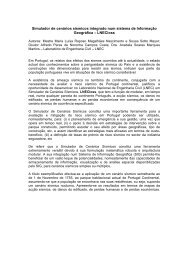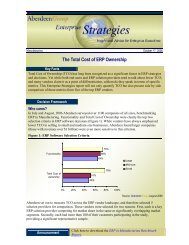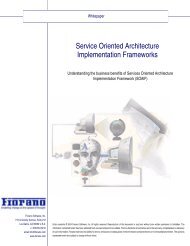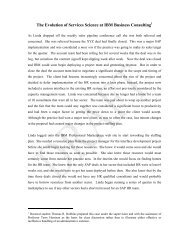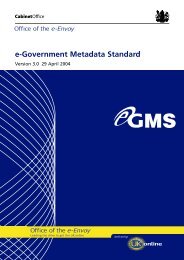OECD Peer Review of E-Government in Denmark - ePractice.eu
OECD Peer Review of E-Government in Denmark - ePractice.eu
OECD Peer Review of E-Government in Denmark - ePractice.eu
Create successful ePaper yourself
Turn your PDF publications into a flip-book with our unique Google optimized e-Paper software.
considerable strategic importance to Danish e-government, due to the large role local government<br />
plays <strong>in</strong> government service delivery.<br />
Although recent changes to the governance <strong>of</strong> KMD have helped clarify its stand<strong>in</strong>g <strong>in</strong> relation to<br />
supply <strong>of</strong> ICT to municipalities, by all accounts it rema<strong>in</strong>s so dom<strong>in</strong>ant a player that is has a virtual<br />
monopoly position <strong>in</strong> many product or service areas.<br />
Many <strong>of</strong> the systems that KMD provides to municipalities can be described as “legacy” systems<br />
that many Danish commentators feel impose a fundamental limit on the ability <strong>of</strong> municipalities to<br />
fully embrace and deliver e-government. A wide range <strong>of</strong> <strong>of</strong>ten contradictory and polarised views<br />
were expressed, <strong>in</strong>clud<strong>in</strong>g:<br />
• KMD uses its position <strong>of</strong> market dom<strong>in</strong>ance to lock municipalities <strong>in</strong>to use <strong>of</strong> outdated,<br />
expensive, and non-<strong>in</strong>teroperable (<strong>in</strong> terms <strong>of</strong> their alignment with the Danish enterprise<br />
architecture) <strong>in</strong>formation systems. It is also seen to be unresponsive to customer demands, due<br />
to the fact that it faces little or no competition <strong>in</strong> many areas.<br />
• Municipalities’ heavy reliance on KMD has led them to under-<strong>in</strong>vest <strong>in</strong> develop<strong>in</strong>g the<br />
knowledge and skills necessary for effective and <strong>in</strong>dependent participation <strong>in</strong> e-government.<br />
• The existence <strong>of</strong> KMD is a vital element <strong>of</strong> successful implementation <strong>of</strong> the Structural<br />
Reform, as it will both provide for cont<strong>in</strong>uity <strong>of</strong> municipal operations while mergers take<br />
place, and support changed adm<strong>in</strong>istrative functions through various “Structural Reform<br />
Packages” that many municipalities will rely upon as the basis <strong>of</strong> their ICT environment<br />
dur<strong>in</strong>g and beyond the reform process.<br />
• Widespread reliance on KMD allows for more cost-effective development <strong>of</strong> municipal ICT<br />
systems and applications, especially due to economies <strong>of</strong> scale. It also allows for more<br />
consistent levels <strong>of</strong> front- and back-<strong>of</strong>fice service provision, which supports better<br />
user-outcomes.<br />
• KMD distorts the structure <strong>of</strong> the municipal ICT market, which reduces competition, lowers<br />
quality, and <strong>in</strong>hibits <strong>in</strong>novation. This situation is said to be contrary to general Danish<br />
competition policy, and also to the <strong>Government</strong>’s plans to make the ICT <strong>in</strong>dustry as<br />
competitive as possible.<br />
The bias <strong>of</strong> comment was heavily towards the negative, although commentators consistently<br />
noted that the effect KMD has on municipal e-government is complex. On one hand, they cited the<br />
usual downside effects <strong>of</strong> monopoly while, on the other, acknowledg<strong>in</strong>g benefits such as the fact that<br />
KMD has provided the necessary ICT capacity to allow for relatively uniform implementation <strong>of</strong><br />
many different municipal e-government systems, applications and services. There was widespread<br />
criticism <strong>of</strong> KMD’s ability to deliver solutions that were compatible with the common e-government<br />
frameworks be<strong>in</strong>g developed <strong>in</strong> <strong>Denmark</strong>, although it is important to acknowledge that this type <strong>of</strong><br />
problem can arise not only from issues <strong>of</strong> market structure, but also from the simple fact <strong>of</strong><br />
technological evolution. There was also significant criticism <strong>of</strong> KMD focused on the obstacles it is<br />
seen to present to adoption <strong>of</strong> open-source s<strong>of</strong>tware <strong>in</strong> government, which <strong>in</strong>dependent reports have<br />
said could save the <strong>Government</strong> several billion DKK per year.<br />
KMD seems to be respond<strong>in</strong>g to these criticisms. It rema<strong>in</strong>s to be seen how these moves will<br />
impact the big question <strong>of</strong> how the present structure <strong>of</strong> the market for supply <strong>of</strong> ICT to municipalities<br />
is affect<strong>in</strong>g development <strong>of</strong> e-government and/or the competitiveness <strong>of</strong> the ICT <strong>in</strong>dustry <strong>in</strong> <strong>Denmark</strong>.<br />
20








